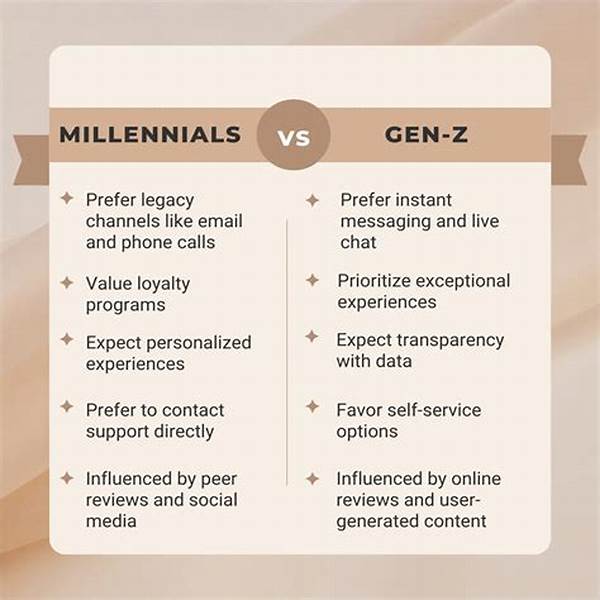In the ever-evolving landscape of education, the generational divide offers fascinating insights into how different cohorts approach learning. Gen Z students, born between the mid-1990s and early 2010s, exhibit learning patterns that diverge significantly from those of millennials, their older counterparts. Understanding how Gen Z studies differently from millennials is not just a quest for educators but an exciting exploration into the future of learning.
Read More : Istirahat Sejenak, Mata Lebih Sehat, dengan Manfaat Istirahat 20-20-20 untuk Aktivitas Harian
Millennials, the first generation to grow up with the internet, have experienced a world where digital and traditional media co-exist. Their education often relied heavily on structured classroom settings, physical textbooks, and linear learning patterns. Fast forward to today’s classrooms, and you’ll find Gen Z tapping into an entirely unique educational experience. With smartphones in hand, they navigate a world brimming with information, fluid in accessing knowledge at the tap of a screen, and naturally adept at utilizing a plethora of online resources for learning.
The Role of Technology in Education
Gen Z has never known a world without smartphones or social media. This digital immersion has naturally shaped their study habits. Unlike millennials, who might still occasionally gravitate towards face-to-face study groups or library sessions, Gen Z students frequently collaborate virtually, using platforms like Zoom or Discord to connect and share notes. They thrive on visual learning, often opting for video content such as YouTube explanations and TED Talks over traditional lecture notes.
Furthermore, gamification and interactive learning take precedence over rote memorization for Gen Z. They want to be actively involved in the learning process, seeking out interactive apps and online platforms that make studying a dynamic experience. Millennials might have been the pioneers in adopting digital tools, but Gen Z has mastered the art of learning through them. This raises interesting questions about how educational institutions need to adapt, as understanding how Gen Z studies differently from millennials is crucial to catering to their educational needs.
—
Description
In the realm of education, the advent of Gen Z has introduced new paradigms. Technology stands as the cornerstone of their academic journey, setting them apart from millennials. While millennials ushered in the internet age, it is Gen Z who have expanded the horizons of online learning. The profound differences in how Gen Z studies differently from millennials not only reveal preferences but also highlight a shift in the educational infrastructure.
The Digital Revolution
Where millennials might remember dial-up internet and first-generation social media platforms, Gen Z has always had high-speed internet at their fingertips. This generation favors digital solutions that provide instant results. They are well-versed with digital libraries, online courses, and AI-powered tutoring systems. The result is a flexible, time-efficient study routine that caters to individual learning speeds, something the linear methods of millennial education could seldom offer.
Personalization and Learning
Gen Z’s approach is marked by a desire for personalization in their studies. Adaptive learning technologies that customize the educational experience to match a student’s learning style and pace are highly favored. For Gen Z, the one-size-fits-all model of education is archaic. Millennials, conversely, worked with set curricula and standardized tests. These personalized learning experiences add a new layer of excitement and engagement for Gen Z, underscoring how Gen Z studies differently from millennials.
With the ongoing transformation in educational experiences, institutions and educators face the challenge of bridging these generational gaps. The solution lies in embracing change and fostering innovation to cater to the learning needs of future generations.
—
Goals for Understanding How Gen Z Studies Differently from Millennials
—
Adapting Education for a New Generation
Educational institutions are faced with the exciting challenge of adapting to this new digital age. With Gen Z at the center of this transformation, developing an educational framework that embraces these changes becomes essential. Understanding how Gen Z studies differently from millennials allows educators to create a more inclusive, accessible, and engaging learning environment.
Unlike traditional settings where the teacher was the primary source of information, Gen Z sees educators as guides in their learning journey. They utilize podcasts, educational apps, and forums to supplement their learning, often seeking resources that best fit their individual needs and learning styles. This shift towards student-centered learning emphasizes active participation and critical thinking.
The Future of Learning
The integration of virtual reality (VR) and augmented reality (AR) in educational practices provides new dimensions of learning. Gen Z’s comfort with technology makes these innovations more feasible and appealing. For example, history lessons can come to life through virtual museum tours, offering immersive learning experiences that were not possible for millennials in their academic years.
Building a Bridge
However, it is not just about replacing old methods with new ones. The real challenge lies in building a bridge between the generational gaps in learning preferences. Education is not one-size-fits-all, and as such, remarkable opportunities arise for creating diverse learning paths that cater to each generation’s strengths and preferences.
The journey of adapting education to how Gen Z studies differently from millennials is both fascinating and necessary. As education becomes more intertwined with technology, we look forward to not just meeting the needs of today’s students but preparing them for the future confidently and capably.
—
Key Insights into How Gen Z Studies Differently from Millennials
In understanding how Gen Z studies differently from millennials, we uncover a landscape ripe for innovation, ushering in a future where learning is a personalized adventure. Educational systems globally are under transformation, inspired by the adaptive, tech-savvy habits of Gen Z.
The Evolution of Educational Practices
As we explore this educational evolution, it’s important to recognize the diverse methods of knowledge acquisition employed by Gen Z that can revolutionize the traditional approaches familiar to millennials. Online quizzes, mobile learning apps, and discussion boards redefine study routines, creating engagement and enhancing understanding.
Embracing Change
The real power lies in embracing these changes and leveraging them to build inclusive educational models that cater to all learning styles. Conversations around how Gen Z studies differently from millennials are just the beginning of an exciting journey towards educational excellence.
As educators and institutions embrace the challenge, they not only prepare Gen Z for academic success but also equip them for the real-world challenges they will face in the coming years. The future of education is dynamic, and by understanding generational nuances, it can be as transformative as the students it serves.


